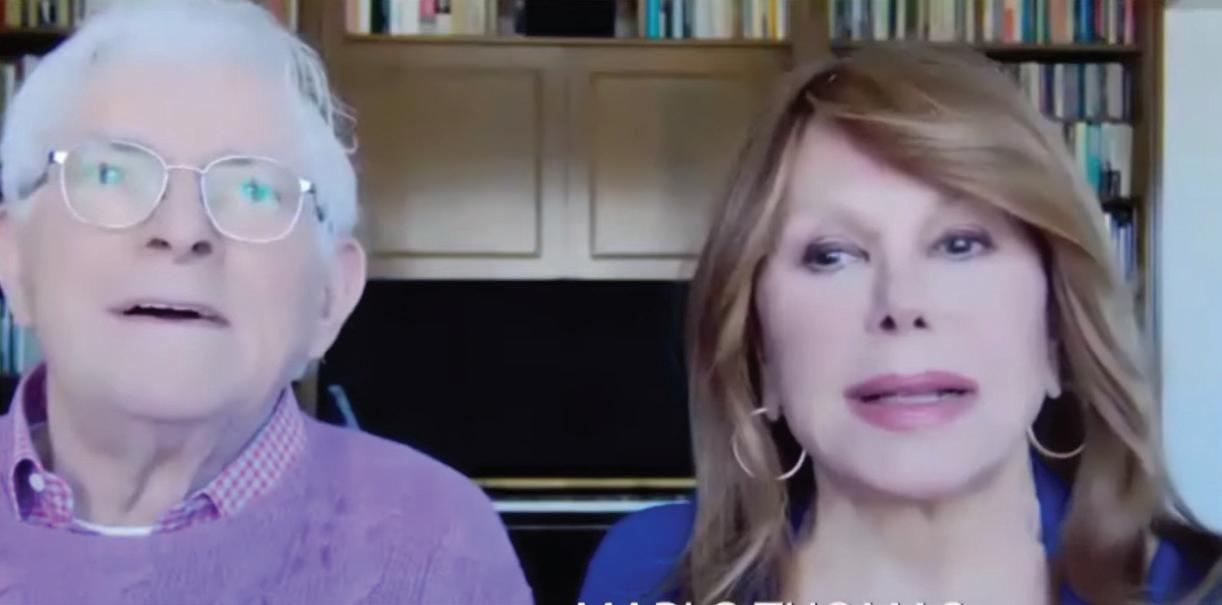
19 minute read
The uses and limits of American military power
WHAT MAKES A MARRIAGE LAST?
The husband-and-wife team of Marlo Thomas and Phil Donahue report
He was the king of daytime television, bringing new and frequently controversial topics into American living rooms with his daily talk program “The Phil Donahue Show.” She has a 60-year acting career that ranges from starring in “That Girl” in the 1960s to (most recently) Ocean’s 8. Their lives changed and became forever entangled when Marlo Thomas appeared on “The Phil Donahue Show” in 1977. Reportedly a matter of “love at first sight,” the couple got married in 1980.
CHERYL JENNINGS: This month Marlo and Phil will be celebrating 40 years of marriage.
First of all, you have survived writing a book together, your first project. What was that like for you? PHIL DONAHUE: Well, you said “survive.” We didn’t expect the virus to be accompanying our effort as authors.
After all these years of marriage, I learned a lot about my wife during this period. JENNINGS: Anything you care to share? DONAHUE: I was impressed with how conscientious she was. I mean, she knew everything. Every interview that we were scheduled to have, she knew what time, she knew where it was coming from, and how much time we had and that I better show up. MARLO THOMAS: The great thing about us, the reason we got along so well is we have completely different personalities, Phil is Mr. Cool, Mr. Laid Back. He did 29 years of television, 6,000 hours. I mean, he’s the master he walks in and whatever he thinks, he says. I, on the other hand, I’m making
MARRIED FOR 40 YEARS,
Marlo Thomas and Phil Donahue reveal what they learned about long-lasting marriages from talking with 40 couples. From the May 13, 2020, online program “Marlo Thomas and Phil Donahue: What Makes a Marriage Last.” MARLO THOMAS Actress; Co-Author, What Makes a Marriage Last: 40 Celebrated Couples Share with Us the Secrets to a Happy Life PHIL DONAHUE Former TV Host; Co-Author, What Makes a Marriage Last: 40 Celebrated Couples Share with Us the Secrets to a Happy Life In Conversation with Cheryl Jennings, Emmy Award-Winning Journalist
notes, I’m figuring out questions. I’m doing all kinds of research to be sure that I get it right. He’s just cooler. It’s great, because when we went to interview Elton John and David Furnish in Toronto, the assistant gave us the message that we’d only have a half hour. I said, “Oh my God, a half hour.” All the interviews were like two hours. So I went into a complete panic mode and I started making rapid-fire questions, like 30 questions that could get one-minute answers. I was so panicked about it, because I wanted to have a rich interview. Phil, on the other hand, put his feet up and turned down the sports on television. I said to him, “Aren’t you going to help me with this?” He said, “Oh, don’t worry about that. They’re not going to stop us
—MARLO THOMAS
Left: Johnny Carson (left) with Phil Donahue on “The Phil Donahue Show” in 1970. (Photo by Rollyn Puterbaugh.) Right: Garry Marshall as a fashion photographer and Marlo Thomas as Ann-Marie from the television program “That Girl.” (Photo by ABC Television.)
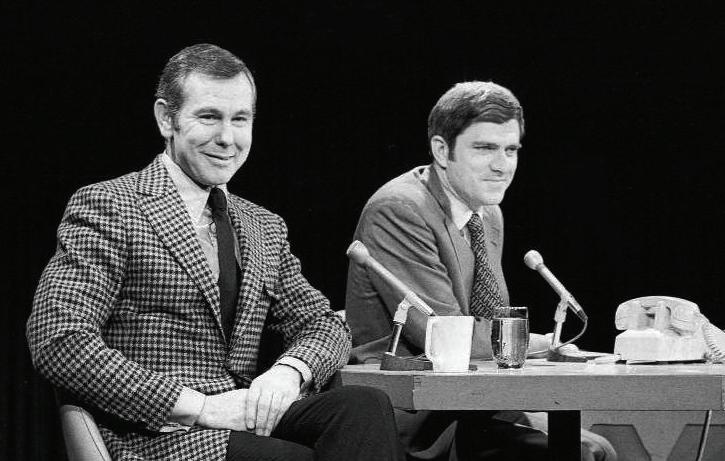

after 30 minutes. Trust me.” Well, I still went ahead and made my notes. And we got up there and we were there for like two hours.
So he’s just got a cooler head about it and I am a “make it happen” kind of person. I think that’s why we got along so well doing the book, because if we were both either his way or my way, it probably wouldn’t work. But because we’re so different, it worked very nicely. DONAHUE: Yeah, it was. It was a very, very interesting adventure for me. And I learned a lot. I was impressed with, for example, during the virus, she wanted [to watch] movies and I wanted to see what Donald Trump was doing. To encourage me to watch a movie once in a while, she made popcorn. Sounds like a small thing, but wow, that got me to sit down and watch the movie. THOMAS: I lured him away from the news. You have no idea how hard that is. JENNINGS: I can imagine, he’s such a journalist. THOMAS: Oh my gosh. Yeah. And I say to him, “It’s the same information, honey, every hour.” He watches like six shows in a row. It’s all the same information, but it’s got a different little tilt. I respect that. He’s a journalist and he loves the news. I’m a movie buff. I grew up in Hollywood. I watch the news for an hour. I’ve got it. I don’t need to keep watching it.
But anyway, to answer your question, we got along fine. We never did a project together before, because I think we thought we wouldn’t do it well, that we might butt heads because we’re both Type A personalities. Even though our personalities are different in many ways, we’re both used to running the show. So I wasn’t sure that that would work, but it didn’t get in the way at all. JENNINGS: Why did you decide to do this particular project as your first project? DONAHUE: As our marriage went on and on, the more we were married, the more fascinated we became with other marriages and the people who occupied them. THOMAS: For a long time. DONAHUE: What was it about them? You know, half of us get divorced. Half of us! THOMAS: Also, this was about a year ago when we were celebrating our 39th wedding anniversary. We were talking about the fact that the world seems so negative. This is before the virus. Just negative. People aren’t getting along. We’re so polarized. Men and women are not in a good place right now. There’s all kinds of accusations, back and forth. [We thought,] We’ve got to do something positive; you’ve got to get love out there again. And we thought, what better way to do it?
Instead of focusing on our marriage, which a lot of people have asked us through the years, “What makes your marriage work?” You don’t really know; you can’t really say, “I don’t know what makes it work.” We like each other. We’re chemically attracted to each other. But I’m not really sure.
So we thought if we went and spoke to a lot of couples, somewhere in the middle of all of that would be enough nuggets that we’d be able to figure out what is it that makes a marriage last. I think we pulled that off with these 40 different couples, right? DONAHUE: Yeah, we got a lot of nuggets, a lot of good nuggets. JENNINGS: You feature 40 couples. That’s so many interviews all over the country. That’s a huge challenge. You picked people from all walks of life—actors, athletes, news makers, writers, comedians, musicians, President Carter and First Lady Rosalynn. How did you choose these particular people? THOMAS: We wanted to pick people, as you say, from all walks of life. John McEnroe from sports, and Sting, LL Cool J, Elton John and all kinds of writers and comedians, Billy Crystal, Ray Romano, Bob Woodward, who won two Pulitzer prizes, he brought down the president with Watergate.
We wanted to get a whole different group of people so that we could see no matter who you are or what you do, no matter if you’re Black or white or brown, or if you’re gay or straight, if you’re young or old—we’ve got some young couples in there that have been married only maybe 16 years, like Melissa McCarthy, and Viola Davis, 17 years—that we wanted to see: Does it change on any level, what you do for a living or what your race is, what your religion [is]? We have Catholic Christians, we have Jews, we have Buddhists, we have Muslims. President
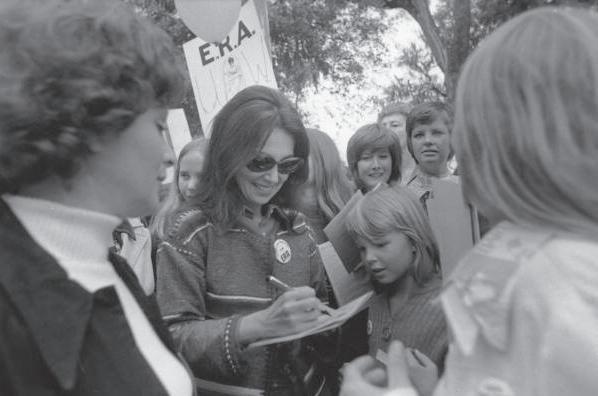
Carter is a Baptist.
What we discovered is that everybody wants the same thing. They want to be able to trust their partner. They want somebody who will love them, and they want to be able to love somebody. They want somebody that has their back. DONAHUE: And how do they solve problems? Or when things get a little rocky as most relationships eventually do, how did they solve that? THOMAS: Every marriage was thrown several challenges. There’s alcoholism and addiction with Jamie Lee Curtis, and Kyra Sedgwick and Kevin Bacon lost all their 30- year savings to Bernie Madoff. Jesse Jackson, straight from his marriage and had a baby with another woman and his wife took him back. Michael J. Fox and Tracy Pollan, three years into their marriage were given the diagnosis that Michael had Parkinson’s, which would last their lifetime. I mean, these are tremendous challenges that a marriage and a family faces, and yet they stuck it out.
What I thought was interesting is that these marriages lasted because people did not run for the exit sign. They really didn’t. Like Kyra Sedgwick said, when you enter a marriage, you have to feel that there was no plan B, there’s no escape route. If you have that feeling, you will get through each thing that comes your way. Because a lot of people expect the other person to make them happy. And if that person doesn’t make them happy in three or four years, they go on to another person who they think might make them happy. But the truth is that what makes you happy is what you build together. What you build together brings you happiness. DONAHUE: Who was it who said it might be easier to fix the relationship you’re in than cut it off and enter into the whole complication of separation and divorce? THOMAS: That was Elsa Walsh, who’s married to Bob Woodward. She said, “I don’t understand this desire for disruption. You know, you get married, and if things aren’t working out, instead of running away and then going through all of this—the energy it takes to separate and get a divorce—put that energy and that focus back into the marriage.” And that’s a very good thought.
You know, Judge Judy is married to another judge, Judge Jerry, and they weren’t getting along. They got a divorce after about 13 years, and they missed each other so much. She was upset with him because she didn’t feel he was taking care of her in the way that she wanted to be taken care of. And he said, “I don’t know how to take care of you any better than I’m doing.” So she said, “Well, I’m leaving.” So they got a divorce. After about a year they missed each other. They started dating, and they got married again. So I said to Judy, “Well, did he change and start taking care of you the way you want?” She said, “No, I accepted it. Now I learned a lot, and I grew up.” So that’s interesting. You’re not going to change each other.”
What was it that James Carville said that was so good? DONAHUE: Carville said when you find yourself going around and around on a Mickey Mouse, unimportant issue, kick that can down the road. His marriage has a pile of cans. THOMAS: Behind every successful marriage is a whole long chain of cans, because people pick at it, pick at it. So we started doing that as one of the things we learned from the book. Sometimes we’ll
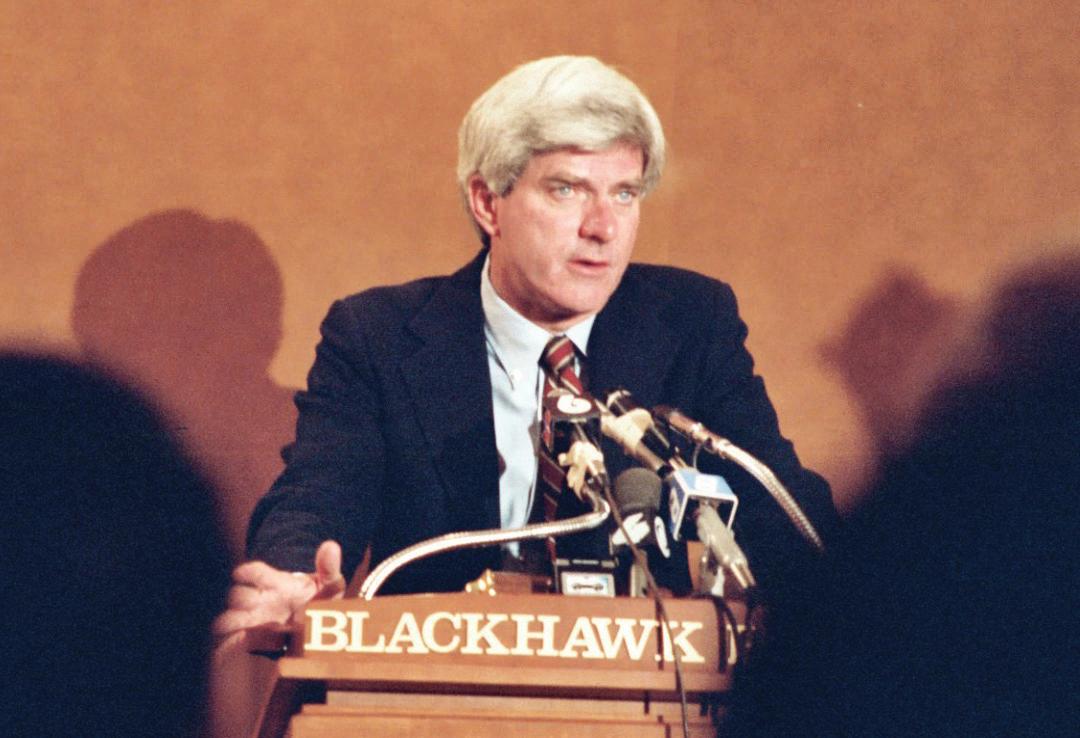
Left: Thomas at an E.R.A. rally in 1978. (Photo by Florida Memory Project.) Right: Donahue visits Davenport, Iowa in 1981. (Photo by Alan Light.)
go around and run on some stupid issue that we just can’t resolve. The first time this happened since our book, Phil turned to me and said, “Oh, let’s just kick this can down the road.” And we did. And it was great. It was wonderful. We thank you, James. Thank you for that. JENNINGS: You knew a lot of the people you interviewed, didn’t you? I’m wondering whether it was easier or more difficult to ask them those really intimate questions, because you asked some really intimate questions. THOMAS: We didn’t really ask a lot of intimate questions. They came across as conversations. We made the decision that we would see each couple in-person. We didn’t do any phone calls. That was a big investment on our part. We had to fly all over the country. We even went to Toronto for Elton John and David Furnish. We went to L.A. and Boston and Texas and Georgia and Chicago and D.C. We went all over the country, and it was a double date. It was the two of us and another married couple. And they would always put out salami and cheese. DONAHUE: We had a olives and crackers and— THOMAS: —and hummus, some people put out a bottle of wine, and we would just have a double date and just start talking. We never started with a question, even though I had in the back of my mind some things I wanted to find out about, like how
do they fight and stuff like that. And Phil liked asking the question, “What were your parents’ marriages like?” which was interesting. But mostly it just came out.
So we didn’t ask Ali Wentworth about her sex life. She said you gotta have a lot of sex and you have to stay with it. But we would have never asked her how much sex do you have? But she offered it. And some people just offered something about their sex lives or how they dealt with money. It was really a conversation. And when we started out, Phil said, “I’m not talking about our marriage.” And then of course, once we got started, we talked to them about it a lot. DONAHUE: Yeah. And once that happened, now we’re really rolling. And when we entered the relationship, we thought we’d maybe do 20 minutes. Well, really— THOMAS: Two hours, two and a half hours. DONAHUE: Yeah. We were there a long time. Finally, after almost three hours, I’d say, “I’m sorry, but we really have to leave. And everybody [got into it]. It’s amazing, something happened when we started talking about our relationships. It started to roll from there. THOMAS: It got to be fun meeting these people that we didn’t know and having these conversations, because when you go out with another couple, even somebody you know very well—like we know Arlene and Alan Alda very well. Alan and Arlene and Phil and I have known each other for years and years. We’ve never sat down at dinner talking about our marriage. The idea that you sit down with another couple for two hours and the topic is marriage—it’s really interesting, because you don’t do that ordinarily.
So this kept going back and forth with stories that were funny, that were sad. We cried a couple of times. It was very interesting.
L i k e w i t h R a y Romano, who’s such a funny guy, and he was funny all through the interview. Then he started talking about [when] his wife Anna was diagnosed with breast cancer, and he got very emotional about that. It was interesting to see a woman’s breast cancer from her husband’s point of view. We usually hear from the woman, but it was interesting to hear him talk about it and how he protected her and how he got the whole family to step up to it. DONAHUE: Alan Alda drove a cab. Of course this is before “M*A*S*H.” He would bring the dollars and the quarters and whatever it was home. Arlene would put it out on the kitchen table and she put it in envelopes. THOMAS: She had little envelopes marked “rent,” “money,” “food,” “utilities.” DONAHUE: And then, when he hit [success] on “M*A*S*H,” he flew home every week on the red-eye. THOMAS: From L.A. back to New Jersey. A lot of sacrifices like that in order for people to have their dream and make their dream come true. What I saw was interesting about Arlene Alda—for nine years, Alan never made a dime from acting, only from cabs and being a doorman, and she supplemented the income.
Billy Crystal’s wife, Janice, also years of him making $4,000 a year, and she had to go out and not only supplement the income, but leave her kids at home. While he would watch the kids during the day, she’d go work all day. Then when she came home, he’d go into New York and try to get a standup

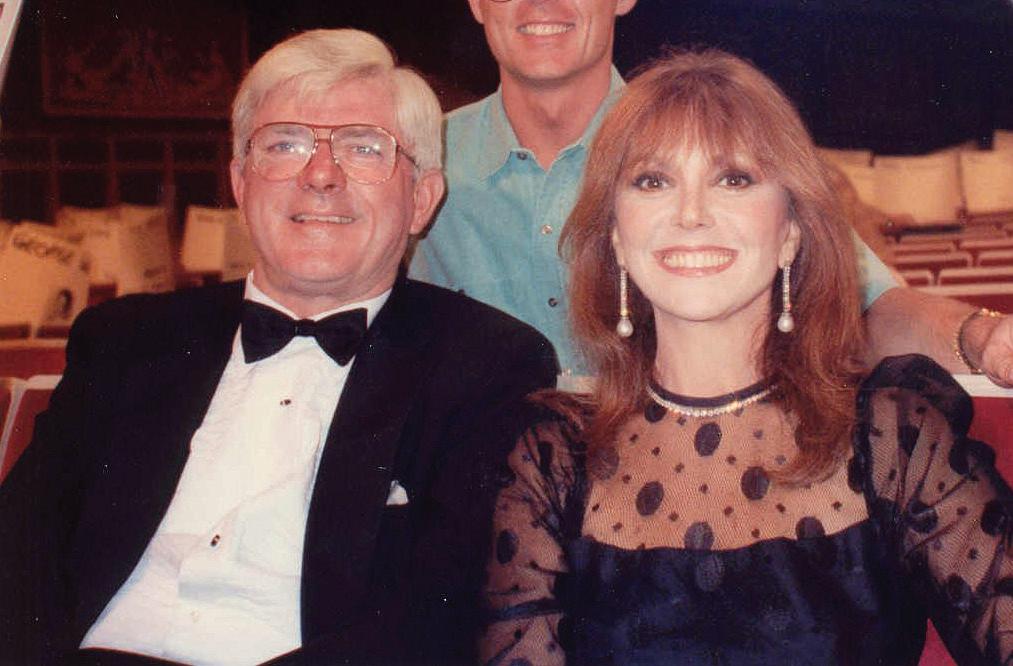
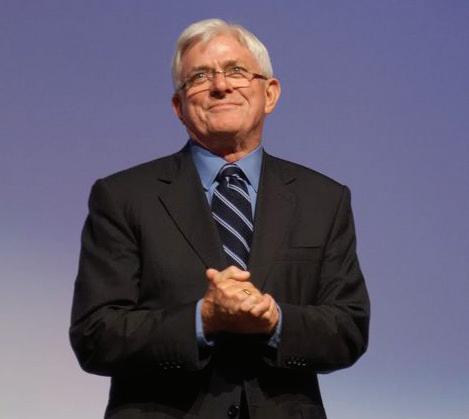
job for the night that paid nothing, $12 or something.
But what I thought was fascinating is that these women did not say, as some wives might, “Why don’t you get a real job?” They never said that. They believed in them DONAHUE: And they were tag-team parents. They would hand off the job of raising the kids or being with them. THOMAS: During the day. They actually said to them, “I believe in you. I know you’re going to make it someday. We’ll just struggle
Top left: Donahue and Thomas at the 41st Emmy Awards in 1989. (Photo by Alan Light.) Center left: Phil Donahue introduces the North American premiere of the documentary Body of War at the Toronto International Film Festival in 2007. (Photo by jbach.) Center right: Thomas at a 2008 book signing. (Photo by Shannon.) Bottom: Journalist Cheryl Jennings (far left) interviews Donahue and Thomas for The Commonwealth Club.
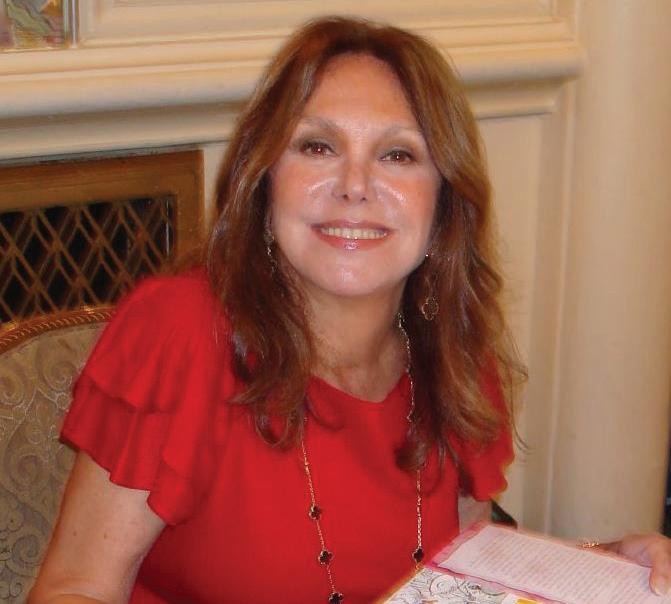
’til you do.” I just thought that was great. We know people in other businesses that went into business because their wives or their husbands just didn’t feel they were going to make it. It was just taking too much away from the family. It’s a very interesting thing. That’s why those marriages lasted. That’s what makes a marriage last—belief in each other, supporting each other’s dreams, which we have done in our lives. JENNINGS: It’s so clear. You talked about Ali Wentworth. For people who don’t know

who she’s married to, can you share a little bit more of that story? THOMAS: She’s married to George Stephanopoulos. I would have never fixed them up in a million years. She is just a wild woman. She’s so adorable. She’s so funny. And so brave. And George is so buttoned up, you know, he’s like a Rhodes Scholar, which I think he is; but he’s so buttoned up and he’s a real statesman. I really trust him as a newsman. But I would never fix them up in a million years. But when we sat with them, you can see it right away. They’re very much in love. They’re very cute together. He’s her anchor, no pun intended, she said, and she is his inspiration. He says she brings all the color into my life. As we were talking, she said, “One of the things that makes a marriage last is you have to have sex and have a lot of it.” She said, “I know, you get the flu and everything. Okay. But if you don’t have the flu, let’s just go for it.” So, I mean, I just adore her. DONAHUE: And Lorrie Sullenberger, the wife of the pilot who landed in the Hudson river, said “He landed on water, He doesn’t walk on water.” So, you know, they all have their own— JENNINGS: Were there any embarrassing moments when you were doing these interviews, where people would say things and go, “Oh, I didn’t mean to say that.” THOMAS: We didn’t have anybody who said, “Well, that’s off the record” or “Don’t repeat that.” I think two different couples said afterward, “Don’t use that part that I said about my daughter” or “Don’t use that part I said about my son.” That was the only thing they wanted to protect. And of course we didn’t [use such comments]. But as far as themselves, they never asked us not to print something that they said.
We were there as adventurers into the land of marriage. We wanted to get at that. We weren’t interested in finding out their dirty linen. JENNINGS: One of the things that I loved in your book [was] when you were describing how you were trying to get these interviews and record them. And it was just the two of you, right? THOMAS: We did everything. The end pages of the book [are] selfies of us and all the couples; we took the pictures. Of course, they gave us their wedding photos. And we did all the recording. Our first interview— tell them about that, with Jimmy Carter. DONAHUE: [Laughs.] Well, the Carters. They were rolling. They were doing very well. When we opened up about our marriage, that triggered everybody with whom we were speaking to open up about theirs. And the Carters— THOMAS: The recorder didn’t work. DONAHUE: Oh, God. First interview. THOMAS: You know, I’m from television. So when the red light is on, that means you’re recording, right? Well on this recorder, when the red light was flashing, you weren’t on yet. Who the heck knew that? So thank God, I had my iPhone that I used as a backup; and Phil said, Oh, we don’t need that. DONAHUE: Yeah. “What are you doing with all this?” THOMAS: Well, thank God we had, ’cause we got in the car, I was all excited to play it back—and I didn’t have it. Oh my God, I started to cry. Jimmy Carter—you can’t go back and get it. It was our first interview. I said to Phil, “Why would we have our first interview be a president of the United States?” Anyway, we had the phone, and thank God it was on the phone.
But what was interesting was when we got everything transcribed each time and we’d look at the transcription, we were excited. We said, “Wow, every one of these interviews was really even better than we thought.” DONAHUE: And all different.
